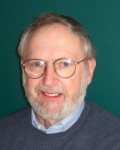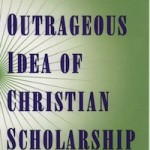A Review of Andreas Köstenberger's Excellence When posted, guest contributor and ESN member David Leonard had recently completed a Ph.D. in philosophy and was teaching a wide range of courses at several universities in the Twin Cities. His project at the time involved developing a taxonomy of the intellectual virtues to be used in college-level philosophy courses. David's scholarship on virtue gave him particular insight to review the book under consideration, Excellence: The Character of God and the … [Read more...] about Evangelical Scholarship and the Pursuit of Excellence
The Outrageous Idea of Christian Scholarship
How can Christian scholars avoid privatizing their faith?
Last week, I wrote about George Marsden's address to InterVarsity Graduate and Faculty Ministries staff, "The Soul of the American University Revisited." Dr. Marsden suggested that worldview naturalism —also called ideological or metaphysical naturalism —was losing its hold on the academy. In contrast, methodological naturalism remained strong and, indeed, was an appropriate stance for Christians in academia. It's this form of naturalism that I want to focus on today. Here's how J. P. Moreland and William Lane Craig … [Read more...] about How can Christian scholars avoid privatizing their faith?
Is Naturalism Losing Steam?
Last week, Tom and I attended the national staff meetings for InterVarsity Graduate and Faculty Ministries, which continued the theme of Campuses Renewed from our national staff conference in January. Our speakers could not have been better: historian George Marsden, the Francis A. McAnaney Professor of History at the University of Notre Dame, who wrote the seminal book The Outrageous Idea of Christian Scholarship (see our online book discussion for more details), and University of Cincinnati Provost Santa Ono, who … [Read more...] about Is Naturalism Losing Steam?
Outrageous Idea 6: Building Academic Communities
The final chapter in George Marsden's The Outrageous Idea of Academic Communities Christian Scholarship [Oops! - Ed.] proposes that even the most impressive work of individual Christian scholars is not enough; Christian scholarship needs "a strong institutional base." Scholars, like everyone else, depend on communities. If like-minded academics do not form their own sub-communities, then they will be dependent entirely on the communities that already exist. These, of course, have little place for inquiry concerning … [Read more...] about Outrageous Idea 6: Building Academic Communities
Outrageous Idea 5: The Positive Contributions of Theological Context
Are there positive contributions to be offered by a theological context? George Marsden responds with a hearty yes. Why? Because he believes (or should I say thinks, understands, or perceives): Scholars do not operate in a vacuum, but rather within the frameworks of their communities, traditions, commitments, and beliefs. Their scholarship, even when specialized, develops within a larger picture of reality. So we must ask: What is in that larger picture? Is there a place for God? If so does God's … [Read more...] about Outrageous Idea 5: The Positive Contributions of Theological Context


